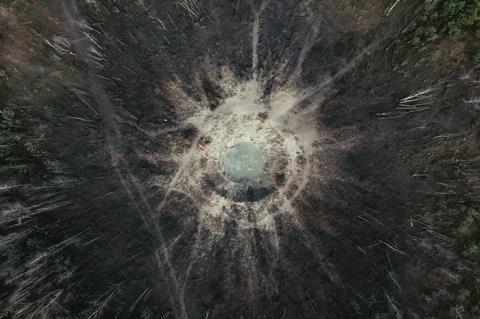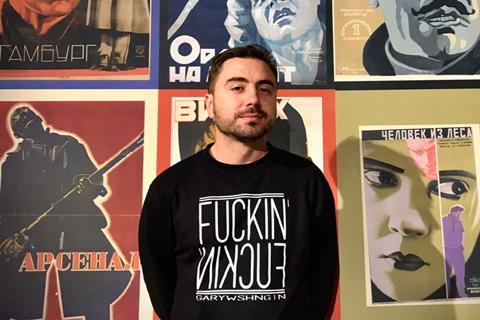
The Karlovy Vary world premiere on Sunday (July 6) for Ukrainian documentary Divia marks the end of a long road for director Dmytro Hreshko and crew. To raise funding, they travelled to numerous pitching sessions and works in progress workshops across Europe - among them Jhi.Lava, Dok Leipzig, Sarajevo and Trieste – whilst dealing with the everyday reality of the Russia-Ukraine War. It has been a labour of love during extraordinarily difficult times.
Divia, named after the ancient Slavic goddess of nature and all living things, highlights the ecological impact of Russia’s invasion of Ukraine. With a score by musician Sam Slater - who produced the soundtracks for Chernobyl and Joker – the film eschews dialogue and focuses on the destroyed fields, the forests turned to ash and the discarded military hardware that rusts in silence. But amongst the devastation, nature tries to find ways to recover.
Hreshko’s credits include 2021’s Mountains And Heaven In Between which screened at the likes of Sheffield DocFest, FIPADOC, DOK Leipzig, and Krakow Film Festival. The film is produced by Kyiv based UP UA Studio and Polish outfit Gogol Film. The film is co-produced by Amsterdam’s Valk Productions.
What made you want to focus on the ecological impact of the full-scale invasion of Ukraine?

War is destroying nature but nature is trying to recover. For me it was really important to make a political statement: the film is not only about nature and ecology but it’s also about politics and puts the situation in Ukraine in focus.
On another level, we were also trying to make it universal: any citizen in any country can feel pain at the loss of nature. You might have some really lovely, natural places that you visit with your family – how would you feel if it was destroyed at any moment?
Considering the situation in Ukraine, how challenging was it to get the film put together?
It’s thanks to the efforts of the producers and the people who helped our project to get into industry workshops. Each workshop helped us clarify our ideas. It’s the first project where we have gone to a lot of workshops, pitches and markets. And I can say it works. Using the resources of mentors and of consultants can really improve your project.
It was really challenging though. Sometimes the government allowed me to go abroad and sometimes not, so it was only the producers presenting the project at workshops. And – like many Ukrainian projects - we’re trying to submit for any calls abroad that exist, so it meant submitting lots of applications and waiting.
But we were pretty lucky. Each time the money ran out, we would get some small supporting funds – and then we got the big co-operation with [the producers in] Poland and the Netherlands.
Also, we have the same problem as any artist in the Ukraine. There is bombing all the time. When we were trying to edit, the electricity would suddenly switche off. It was a real problem, so we used some big power banks to continue to work. Also, some members of our team were mobilised into the army, like our sound designer who joined the army at the end of 2024. I have been in the army for half a year already.
So our industry is struggling with all this stuff. I don’t know how the Ukrainian film industry is alive, but it is.
Can you expand a little bit more about the practical logistics of shooting in a war zone?
It was my first time going into the war zone. I had never been to the East before the full-scale invasion. For me, it was psychologically hard to start. I asked a lot of my friends who had been in a war zone what to do. I also got special training for journalists – like tactical medicine. And I bought a helmet and a shield.
I connected with the deminers who clear mines, and with ecologists who clean territories. I also connected with locals, people who care about forest and the Ministry of Ecology helped me with contacts. Step by step I found more and more places and subjects to film.
What I filmed was often unexpected. I would just go into an area and might see some incredible scene of birds walking on burned fields, and I just started thinking: “I never plan because if I plan it, I never get it.”
It’s like hunting for me. But it’s hunting where you can be injured – you can be killed by bombing or there are mines everywhere. You can’t just stop on any roadside or walk in a field to see something interesting: it’s totally impossible to walk safely.
What of your future?
I guess the main priority for me for now is survive. The fact that we made this film is miracle because we have a full-scale invasion by Russia who want to kill all Ukrainians.
For now I am in the armed forces – I am part of the Cultural Forces, which involves some media projects to support Ukrainian soldiers and to integrate culture to army – such as music, art and films. I’m really glad to be able to use my skills to support the army.
I have some ideas for documentaries for sure and I am just waiting for the chance to realise them. But the main plan is to survive.

























No comments yet